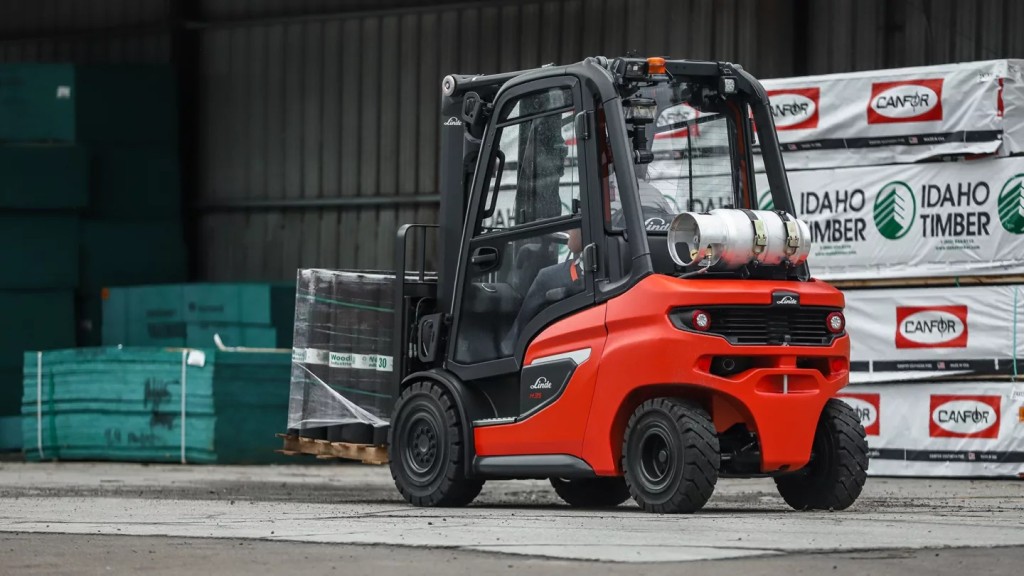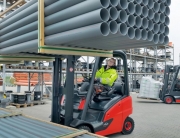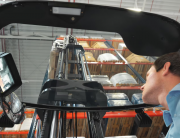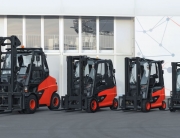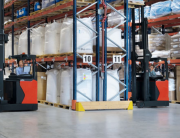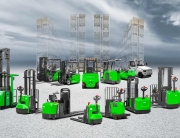When it comes to choosing between electric and propane forklifts, one of the key factors to consider is your overall forklift ownership cost and not simply the purchase price. Each type of forklift has unique advantages, operational costs, and applications that make them better suited for specific needs.
In this post, we’ll dive into the overall forklift costs for both electric and propane forklifts, explore their pros and cons, and outline the scenarios where each type excels. To make your decision easier, we’ll also answer some frequently asked questions about electric vs. propane forklifts. Let’s help you find the best option for your business! Click on the following sections to learn more.
- Forklift Ownership Cost: Electric vs. Propane
- Advantages and Disadvantages of Electric and Propane Forklifts
- What Are the Best Applications for Electric and Propane Forklifts?
- Electric Forklifts vs. Propane Forklifts – FAQs
If you are in the market for a new forklift and would like expert advice to help you choose the perfect model for your needs, contact us.
Forklift Ownership Cost: Electric vs. Propane
1. Forklift Ownership Cost: Electric vs. Propane
When considering forklift ownership, it’s essential to look beyond the initial purchase price and factor in the ongoing costs to keep your forklift running efficiently.
Below is a breakdown of the total cost of ownership for electric and propane forklifts.
Propane Forklifts:
A 5,000 lb. cushion propane forklift typically costs between $24,000 and $30,000.
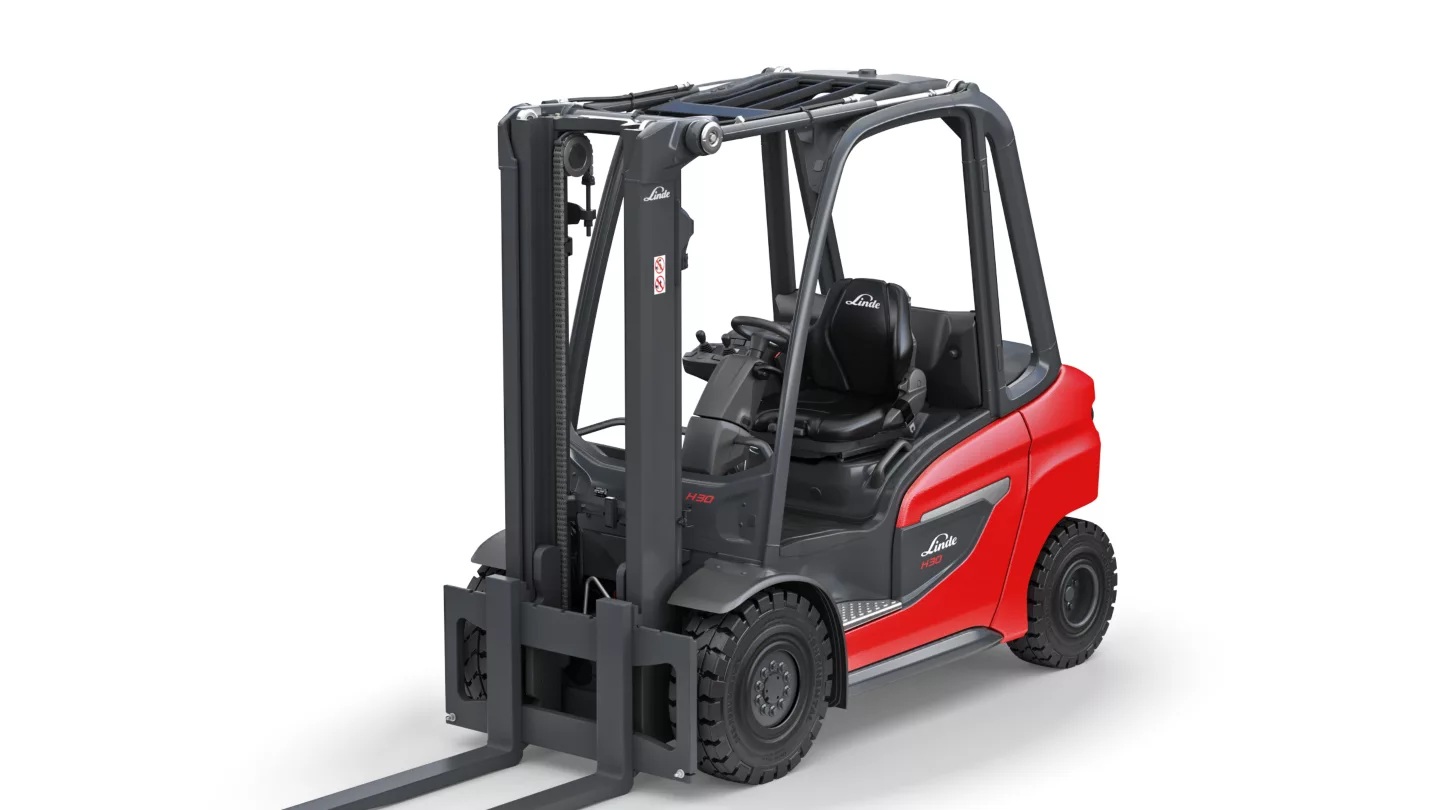
Propane Forklift – Image by Linde
Initial Purchase Costs
Electric Forklifts:
The upfront cost for an equivalent electric forklift is higher, ranging from $35,000 to $40,500. This price includes:
Battery: $7,000 to $9,000
Charger: $3,000 to $5,000
While the initial investment in an electric forklift is higher, this is primarily because the battery cost is essentially prepaid fuel.
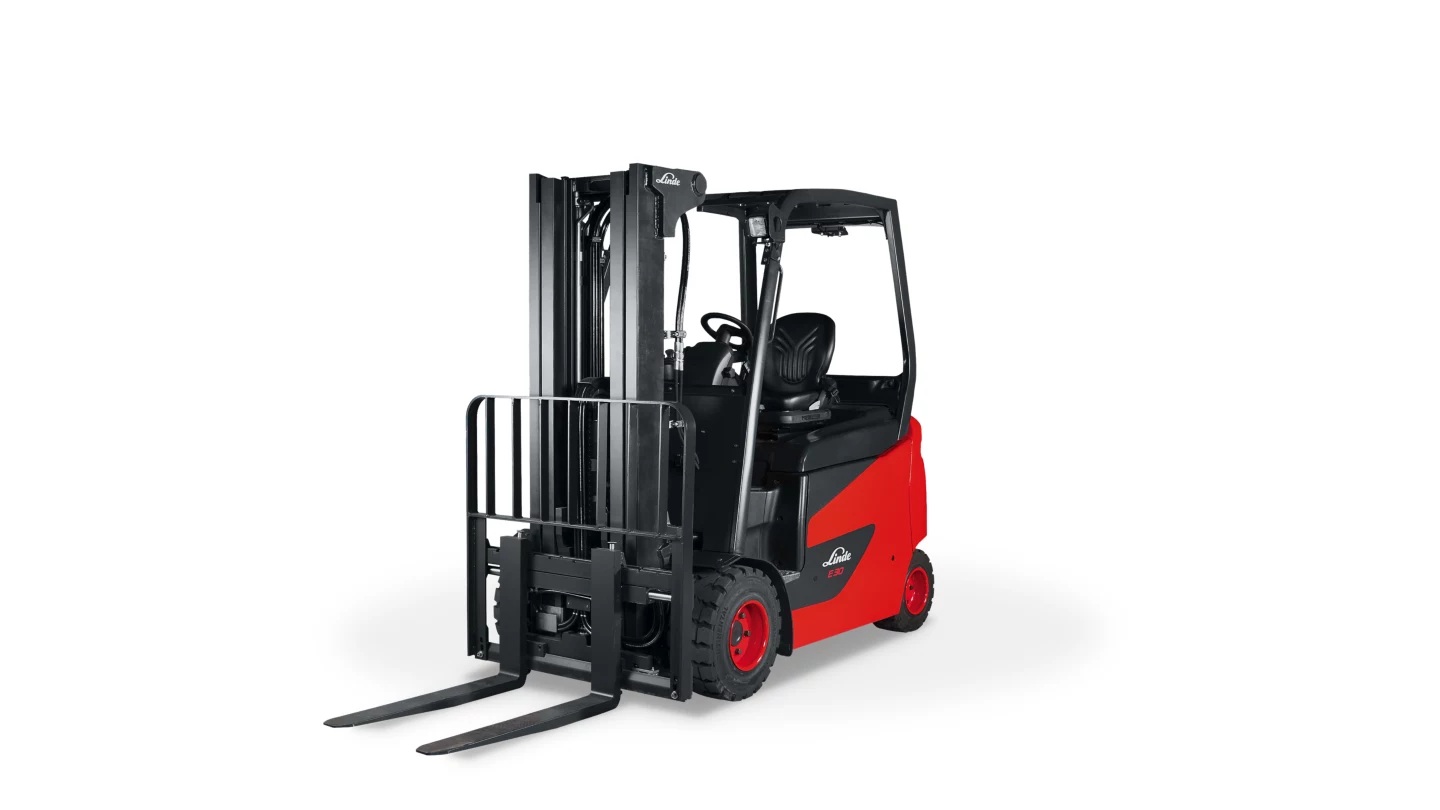
Electric Forklift – Image by Linde
Additional Costs for Electric Forklifts
To operate an electric forklift, you may need to invest in:
- A battery charger
- Eyewash stations and safety equipment for battery handling
- A separate charging area with proper ventilation
- An electrician to install the charger or upgrade your facility’s electrical system if needed
Operating Costs
Electric forklifts have a significantly lower forklift ownership cost compared to propane forklifts. According to First Energy, it is 75% cheaper to operate an electric forklift than a propane one.
In fact, most operations can expect to recoup the higher upfront cost of an electric forklift within two years of usage.
Advantages of Lithium-Ion Forklifts Over Lead-Acid Forklifts
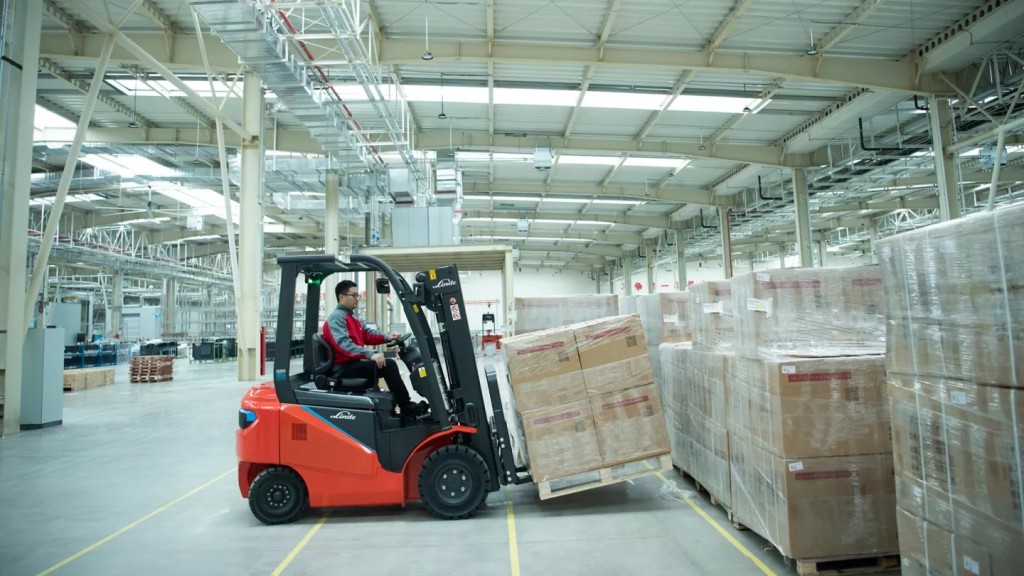
Lithium-ion batteries are more energy-efficient, providing consistent power output throughout their charge cycle. – Image by Linde
Lithium-ion forklift technology offers several advantages over traditional electric forklifts that have lead-acid batteries, simplifying operations and further reducing ownership costs.
No Need for Eyewash Stations or Battery Handling Safety Equipment
Unlike lead-acid batteries, lithium-ion batteries are sealed units that do not require manual water refilling or maintenance. This eliminates the need for:
- Eyewash stations: Since there’s no risk of acid spills or splashes during maintenance.
- Special safety equipment: Employees don’t need protective gear to handle the batteries.
This reduces upfront setup costs, ongoing safety expenses, and the risk of workplace injuries, thus further lowering your forklift ownership cost.
Other Advantages of Lithium-Ion Batteries
- Opportunity Charging: Lithium-ion batteries can be charged during short breaks without affecting their lifespan. This eliminates the need for extended downtime, boosting productivity and efficiency.
- No Dedicated Charging Areas: Because lithium-ion batteries don’t emit harmful gases during charging, there’s no need for ventilated, designated charging spaces.
- Longer Lifespan: Lithium-ion batteries last significantly longer than lead-acid batteries, often providing up to 3,000 charge cycles compared to 1,000–1,500 cycles for lead-acid.
- Higher Efficiency: Lithium-ion batteries are more energy-efficient, providing consistent power output throughout their charge cycle without the performance drop-off common in lead-acid batteries.
- Better Performance in Cold Environments: Lithium-ion technology has improved to perform more reliably in cold storage applications compared to lead-acid batteries.
While lithium-ion forklifts may come with a higher upfront cost compared to their lead-acid counterparts, their numerous advantages—such as reduced safety requirements, increased efficiency, and minimal downtime—make them a superior choice for many operations. These features not only simplify maintenance but also contribute to long-term cost savings and improved productivity.
Maintenance Costs
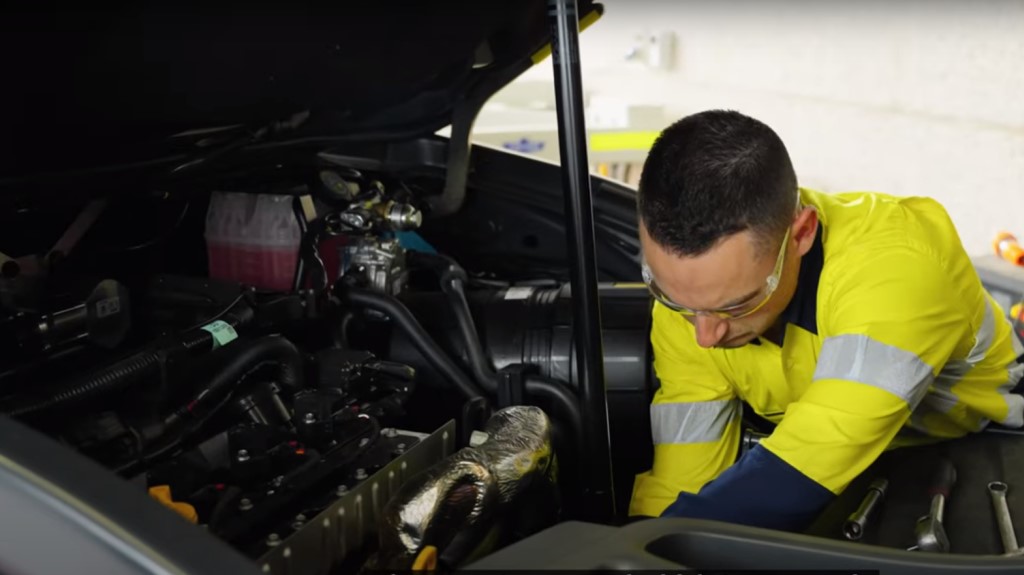
Propane forklifts require more maintenance than electric forklifts.
Maintenance costs can greatly affect your total forklift ownership cost. According to First Energy Corporation, electric forklifts will give you a 40% reduction in maintenance costs over a similar propane model. Here are the factors that contribute to your maintenance costs for both electric and propane forklifts.
Electric Forklifts:
- Require less maintenance due to fewer moving parts.
- Do not need motor oil, as they lack an internal combustion engine.
- Use hydraulic oil for lifting, tilting, and powering attachments like side shifters and fork positioners.
- Maintenance costs are approximately $1.25 per hour of operation.
Propane Forklifts:
Propane forklifts require regular maintenance, including:
- Oil changes
- Engine tune-ups
- Cooling system top-offs
- Air/fuel mixture adjustments
- Filter replacements
Maintenance costs are approximately $2.00 per hour of operation, nearly 40% higher than electric forklifts.
Key Takeaway
While propane forklifts have a lower upfront cost, electric forklifts save significantly on operational and maintenance costs. Over time, these savings offset the initial investment, making electric forklifts the more cost-effective option for many operations.
2. Advantages and Disadvantages of Electric and Propane Forklifts
Beyond the overall cost of ownership, electric and propane forklifts offer unique benefits and challenges. Here’s a detailed comparison:
Electric Forklifts
Advantages:
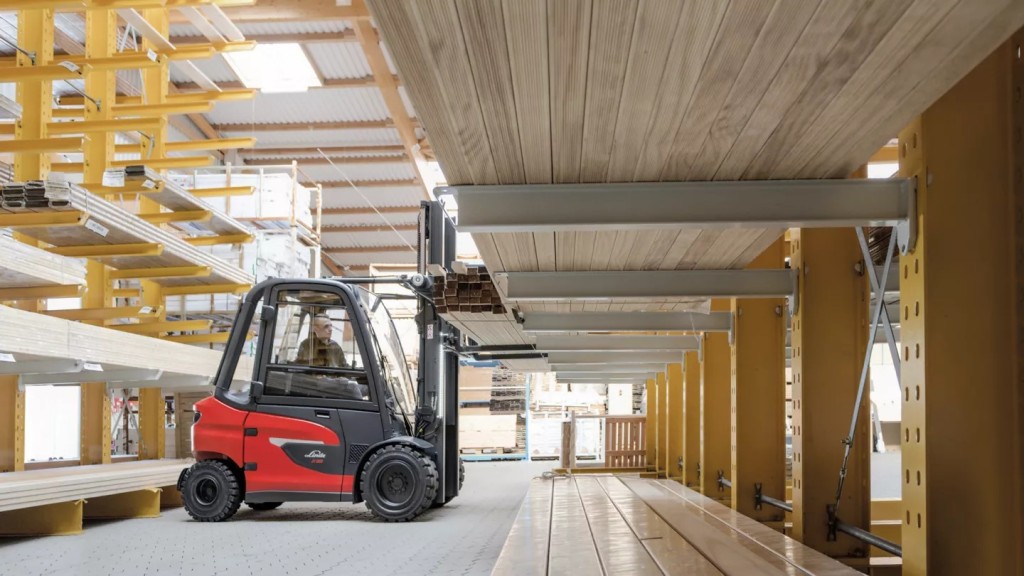
Electric forklifts produce zero emissions, making them ideal for indoor operations. – Image by Linde
- No emissions: Electric forklifts produce zero emissions, making them ideal for indoor operations and industries with strict air quality and environmental regulations, such as food processing and pharmaceuticals.
- Quiet operation: These forklifts operate quietly, which reduces workplace noise and improves communication and comfort for employees.
- Small footprint: Their compact design allows electric forklifts to navigate tight spaces, narrow aisles, and tall racking systems with ease.
- Less maintenance: Electric forklifts require less maintenance because they have fewer moving parts, which helps reduce downtime and lowers maintenance costs.
- Energy efficient: They are highly energy-efficient, providing consistent performance throughout the entire battery charge cycle.
Disadvantages:
- Higher purchase price: Electric forklifts typically have a higher upfront cost because of the inclusion of the battery and charger.
- More downtime: Standard lead-acid batteries require long charging and cool-down periods, which can cause operational downtime unless using opportunity charging or lithium-ion batteries.
- Limited use: These forklifts may face limitations in outdoor or wet conditions unless they are specifically weatherproofed.
Propane Forklifts
Advantages:
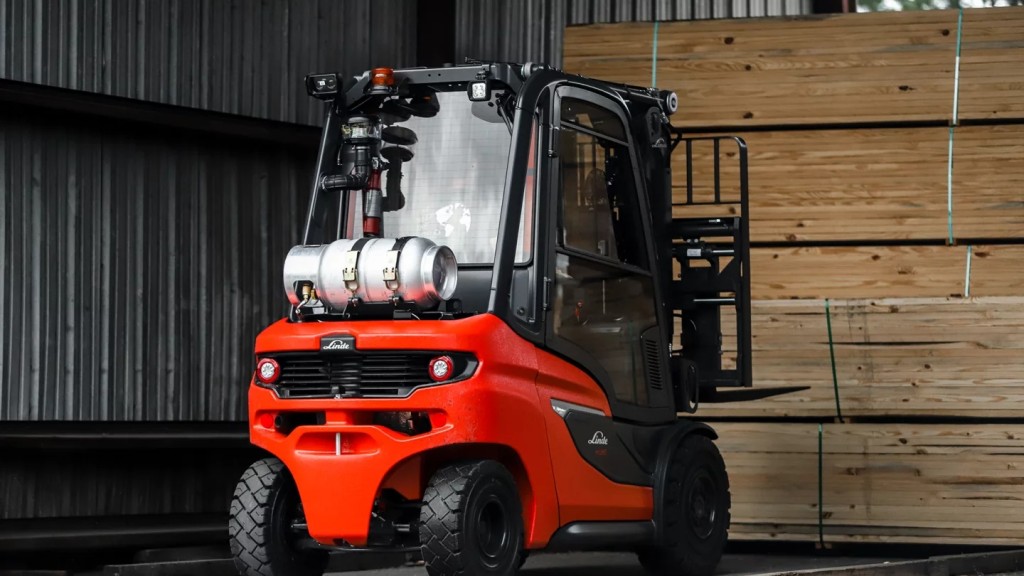
The initial purchase cost of propane forklifts is generally lower compared to electric models. – Image by Linde
- Versatile usage: Propane forklifts are highly versatile and can handle both indoor and outdoor tasks effectively, even on rough terrain or in varied weather conditions.
- Little downtime: They offer continuous operation because propane tanks can be replaced in just a few minutes, avoiding extended downtime.
- Heavy-duty applications: Propane forklifts are better suited for heavy-duty applications and can handle extreme weight capacities with ease.
- Low purchase cost: The initial purchase cost of propane forklifts is generally lower compared to electric models.
Disadvantages:
- Harmful emissions: Propane forklifts emit exhaust fumes, which makes them less suitable for indoor use unless proper ventilation is in place.
- Higher maintenance costs: They require regular engine maintenance, including oil changes, engine tune-ups, and filter replacements, which can increase upkeep costs.
- High fuel cost: The cost of propane fuel can add up over time, especially for businesses with high forklift usage rates.
Summary
When choosing between electric and propane forklifts, the decision should be based on your specific operational needs. Electric forklifts are ideal for indoor use and industries with stringent safety and emission requirements, while propane forklifts are better suited for outdoor applications, heavy lifting, and environments requiring continuous operation.
Carefully weighing these pros and cons will help you make the most cost-effective and practical choice for your business.
3. What Are the Best Applications for Electric and Propane Forklifts?
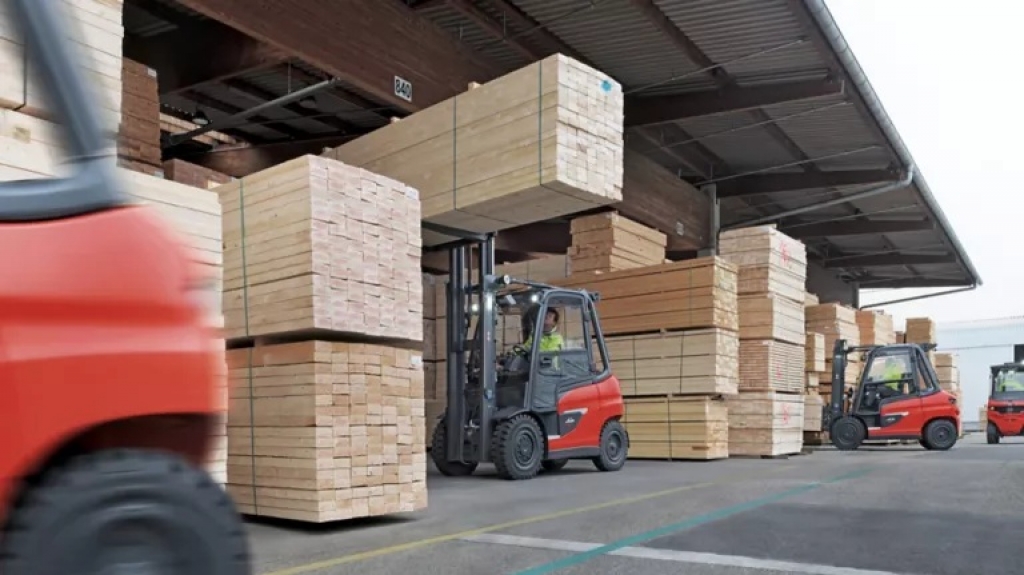
Certain industries are naturally better suited for either propane or electric forklifts. – Image by Linde
Certain industries are naturally better suited for either propane or electric forklifts, depending on operational needs, safety requirements, and infrastructure. Here’s a breakdown of which industries benefit most from each type and why.
Industries Best Suited for Propane Forklifts
Propane forklifts are ideal for applications that demand high power and versatility, especially in outdoor or heavy-duty environments. Their ability to handle extreme weights, operate effectively in rough terrain, and work continuously without long recharging times makes them a reliable choice for industries like:
Agriculture
Propane forklifts are perfect for outdoor work, especially when handling heavy loads and navigating uneven ground.
Construction
These forklifts handle tough job sites with ease and are capable of transporting heavy materials.
Large Warehousing
Propane forklifts are suitable for heavy-duty operations and minimize downtime in large warehousing environments.
Recycling
They are great for handling bulky and heavy scrap materials without difficulty.
Trucking and Logistics
Ideal for loading and unloading trucks in outdoor areas, propane forklifts provide the necessary power and versatility.
Building Supplies
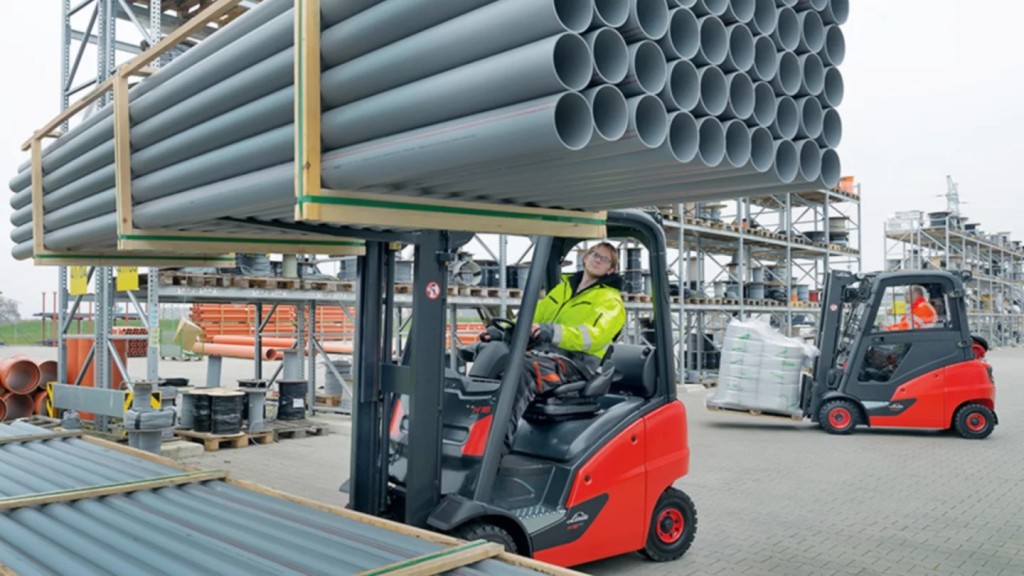
Propane forklifts can handle heavy loads. – Image by Linde
Propane forklifts are strong enough to manage large and heavy materials, making them perfect for building supply operations.
Lumberyards
These forklifts are reliable for moving heavy lumber in outdoor spaces with rugged conditions.
Steel and Scrap Yards
Propane forklifts can handle extreme weights and perform well in tough, rugged conditions found in steel and scrap yards.
Concrete
They are built to efficiently transport dense and heavy loads, making them ideal for concrete operations.
Heavy Manufacturing
Propane forklifts are designed for continuous, demanding operations, making them ideal for heavy manufacturing environments.
Industries Best Suited for Electric Forklifts
Electric forklifts are the go-to choice for industries prioritizing low emissions, indoor safety, and infrastructure efficiency. Their quiet operation, compact design, and ability to work in confined spaces make them ideal for:
Grocery and Retail
Electric forklifts produce zero emissions, which helps maintain indoor air quality in customer-facing spaces.
Warehousing
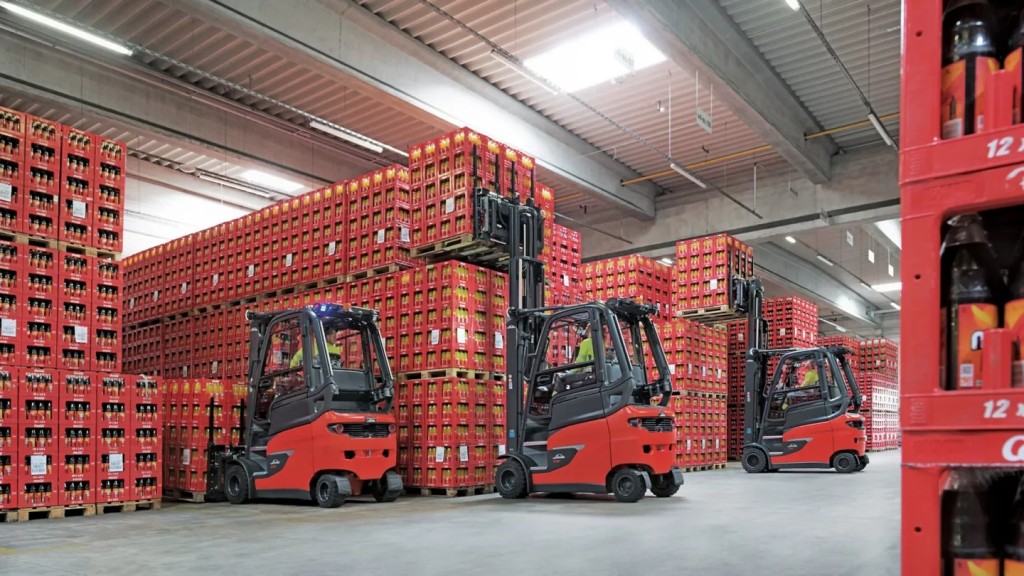
Electric forklifts are a great choice for warehouse operations. – Image by Linde
Electric forklifts are highly favoured in warehouses with tall racking systems and narrow aisles. Their compact design and excellent maneuverability make them perfect for these challenging environments.
Medical Equipment & Pharmaceuticals
They are essential for clean environments and contribute to enhanced worker safety.
Food and Beverage Processors
Electric forklifts ensure compliance with strict hygiene and emissions standards required in food and beverage operations.
Cold Storage
They operate efficiently in temperature-controlled environments, making them ideal for cold storage facilities.
Can You Use a Propane Forklift in a Food Plant?
According to the government of Canada, you should use electric forklifts in any food processing areas as propane may contaminate some stored food.
The Evolution of Lithium-Ion Forklift Technology
Lithium-ion forklift technology has made significant strides in recent years, surpassing the limitations of traditional lead-acid batteries. Modern lithium-ion forklifts are now capable of handling heavier loads, making them a viable option for industries that previously relied on propane or other heavy-duty solutions.
One of the key advancements is their improved performance in colder environments. Lithium-ion batteries are now designed to operate more efficiently in temperature-controlled settings like cold storage facilities, where lead-acid batteries often fall short.
Another major advantage is the ability to leverage opportunity charging, which allows operators to quickly recharge the battery during short breaks or downtime. This eliminates the need for extended charging periods, reducing operational delays and maximizing productivity.
These innovations make lithium-ion forklifts a powerful, efficient, and eco-friendly alternative for a growing range of applications.
4. Electric Forklifts vs. Propane Forklifts – FAQs
Electric Forklifts FAQs
Question: Are Electric Forklifts a Good Option?
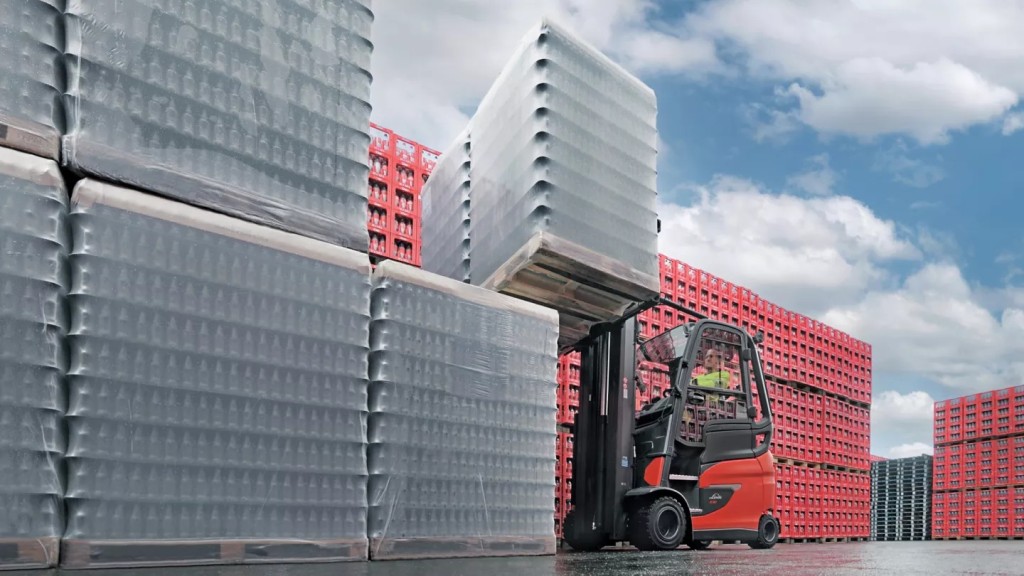
Electric forklifts are a great choice for food and beverage manufacturing. – Image by Linde
If you’ve been wondering whether electric forklifts are a good choice, the answer is: that it depends on your specific needs.
Electric forklifts are an excellent option for many applications, especially for operations that require clean and quiet equipment. For example, industries like food and beverage manufacturing or pharmaceutical production often benefit from electric forklifts because they emit no harmful substances and meet stringent safety and sanitation standards.
However, electric forklifts may not be the best fit for all scenarios. If your operations require continuous runtime, heavy lifting, or frequent outdoor use, propane or other fossil-fueled forklifts might be a better option due to their durability and quick refuelling capabilities.
Overall, electric forklifts have several advantages. They offer a lower overall forklift ownership cost, require less maintenance, and produce zero emissions, making them an environmentally friendly and cost-effective solution for many businesses. And for us, that definitely qualifies as “good”!
Question: How Long Does an Electric Forklift Last?
In the material handling industry, the general rule of thumb is that forklifts last around 10,000 hours. However, the lifespan of a forklift can vary based on factors like operating environment, operator behaviour, and maintenance practices.
Electric forklifts typically last longer than comparable internal combustion (IC) models because they have fewer moving parts.
While the chassis of an electric forklift can last for many years, the battery has a finite lifespan. Lead-acid industrial batteries typically last around 5 years or 1,500 charging cycles, depending on maintenance and proper charging practices.
Question: How Much Electricity Does an Electric Forklift Use?
According to the Electric Power Research Institute (EPRI), an electric forklift typically uses about 15,000 kWh per year, assuming it has a 5,000 lb. capacity and operates for 2,000 hours annually.
Question: How Much Does Electricity Cost for Forklifts?
According to Statista, the average industrial cost of electricity as of June 2023 in Ontario was 10.30 Canadian cents per kWh. Across Canada the price ranges from a low of 5.33 Canadian cents to a high of 35.40 Canadian cents in Nunavut.
With an electric forklift using 15,000 kWh per year, the total electricity cost would be approximately $1,545.00 annually.
Propane Forklifts FAQs
Question: What Does LP Forklift Mean?
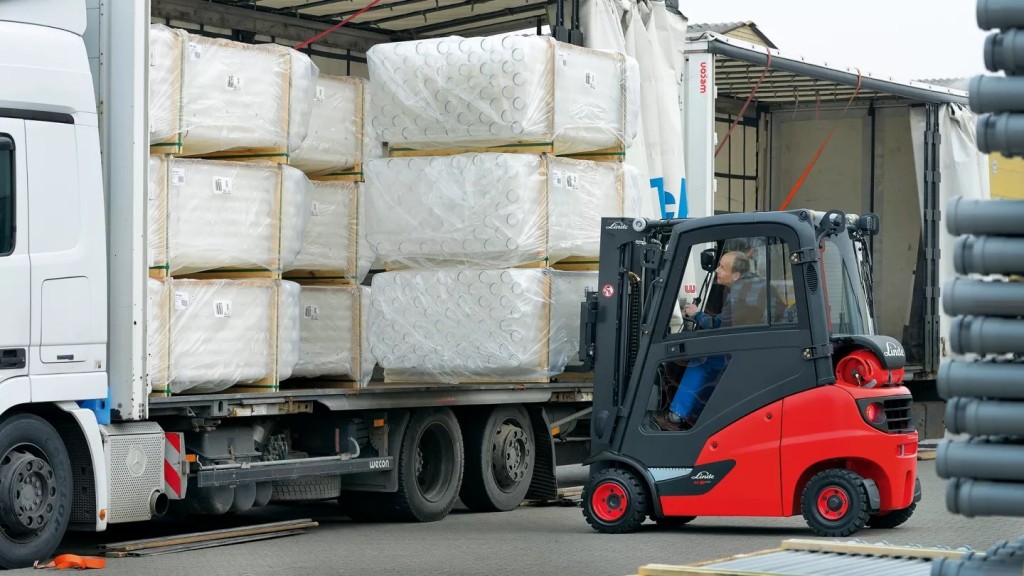
Propane and LPG are essentially the same. – Image by Linde
An LP forklift is an internal combustion forklift powered by propane.
Question: What Does LP Stand?
When talking about different types of gas, LP stands for “Liquefied Petroleum.”
Question: Is Propane the Same as LPG?
Yes, propane and LPG are essentially the same. Propane refers to the gas form, while LPG (Liquefied Petroleum Gas) refers to its liquefied form.
Question: Why Do Forklifts Use Propane?
Forklifts commonly run on propane because it is a clean, efficient, and safe fuel source suitable for both indoor and outdoor use.
A properly tuned propane engine primarily emits carbon dioxide (CO2) and water, making it a lower-polluting alternative to gasoline or diesel. Additionally, propane burns more efficiently than other fuels. According to ForkliftPropane.com, propane achieves an efficiency rating of nearly 90%, compared to 87% for natural gas, 85% for diesel, and 82% for gasoline.
These qualities make propane an ideal choice for forklifts, offering a reliable, cost-effective, and environmentally friendly fuel solution.
Question: Is Propane the Best Power Source for Forklifts?
Not necessarily.
Forklifts can be powered by a variety of fuel sources, including electricity, propane, compressed natural gas (CNG), gasoline, and diesel. While propane is highly versatile and offers great flexibility for many applications, it might not be the best choice for heavy-duty tasks that require maximum power.
For the highest-capacity forklifts, diesel is typically the fuel of choice, as it provides the power needed for the most demanding lifting operations.
However, when it comes to day-to-day material handling, propane is an excellent option, especially for its balance of performance, efficiency, and safety.
Question: How Much Propane Does a Forklift Use Per Hour?
Toyota estimates that a forklift typically consumes around 6 lbs. of propane per hour.
Question: How Long Does a Propane Tank Last on a Forklift?
A forklift propane tank typically lasts between 4 to 8 hours, depending on several factors, including:
- Intensity of work
- Quality of maintenance
- Forklift capacity
- Tire condition
- Operator behavior
Question: How Much Does Forklift Propane Cost?
According to Natural Resources Canada, as of January 21, 2025, Propane cost 128.2 Canadian cents per Litre.
Conclusion
Choosing the right forklift—whether electric or propane—ultimately depends on your specific operational needs and budget considerations. While propane forklifts offer flexibility and performance for heavy-duty, outdoor applications, electric forklifts excel in indoor environments with lower emissions and reduced maintenance costs. By weighing the total cost of ownership, including upfront costs, maintenance, fuel, and operational needs, you can make a more informed decision for your business. Understanding the pros and cons of each option, as well as their suitability for different industries, will help you select the forklift that best aligns with your goals.
We hope this guide has clarified the differences between electric and propane forklifts and provided valuable insights to help you find the best choice for your operations. If you have further questions or need assistance with your forklift needs, don’t hesitate to reach out!
The Linde Advantage: Linde Forklifts Last Longer
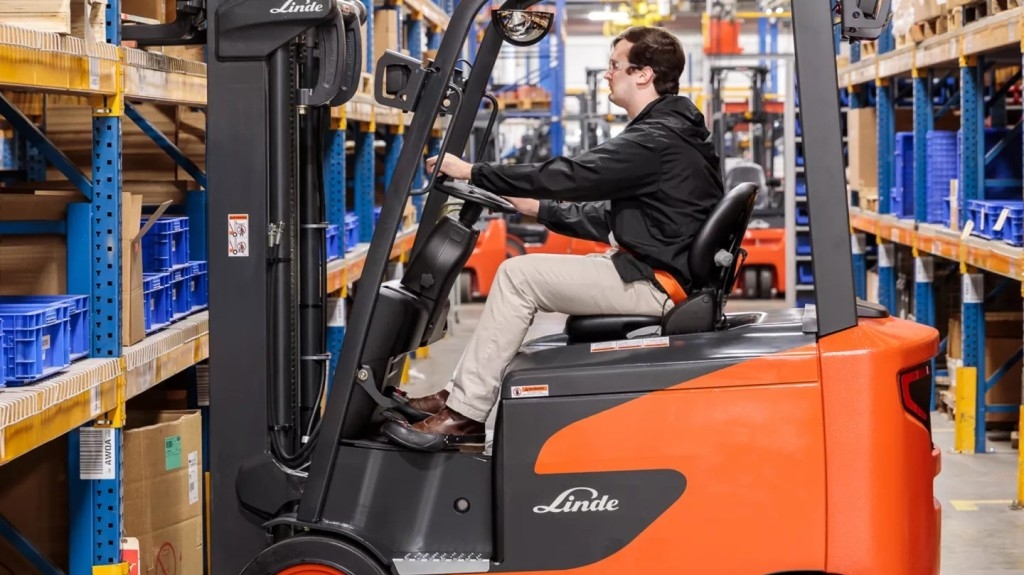
Linde forklifts last twice as long as other brands.
When investing in a forklift, longevity and productivity are key considerations—and that’s where Linde truly excels. Unlike other brands built to a 10,000-hour lifespan, Linde forklifts are engineered to last an impressive 20,000 hours, doubling their operational life and providing exceptional long-term value. This remarkable durability helps justify Linde’s premium price tag, offering unmatched performance and reliability over time.
Why Linde Lasts Longer
Linde forklifts are a testament to German engineering excellence, known for precision and quality. Key design features, like the hydrostatic drive system, eliminate traditional transmission components, reducing wear and tear and enhancing efficiency. Additionally, Linde’s engines operate at lower RPMs compared to competitors, minimizing engine wear and extending their lifespan significantly. These thoughtful innovations ensure that Linde forklifts are built not just to work but to last.
Unmatched Productivity
Durability is only part of the equation. According to TÜV Nord, an independent vehicle inspection and consulting firm, Linde forklifts are up to 22% more productive than any other manufacturer. This productivity boost means you’ll accomplish more in less time, maximizing efficiency and reducing operational costs.
With Linde, you’re not just investing in a forklift—you’re investing in a high-performance machine that delivers unmatched durability, efficiency, and long-term savings.
Looking for a New Forklift? Contact Ri-Go
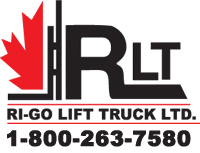
If you are in the market for a new forklift, contact us. Our knowledgeable staff can help you choose the perfect one for your needs.
Since 1977, Ri-Go Lift Truck has been serving customers in Ontario and Quebec with everything they need for material handling. We are committed to providing you with quality service and a high level of customer satisfaction.
We are your authorized dealer for the following top brands:
- Linde Lift Trucks, Power Pallet Trucks, Tow Tractors and Stackers
- Hangcha Forklifts Full Lineup of Electric & IC Equipment
- Blue Giant Lift Trucks and Pallet Movers
- Komatsu Forklifts and Reach Trucks
- Mariotti Lift Trucks – The Worlds Smallest Lift Truck
- Baoli Lift Trucks
- Advance Sweepers and Scrubbers
- Skyjack Genie Booms and Scissor Lifts

In addition to our authorized distributorships, we can also provide you with:
- Large selection of used forklifts
- Operator Training Department – open 7 days a week
- Parts Departments – over 1.4 million dollars of parts on hand for all makes and models
- Service Department – highly trained technicians
- Leasing and Rentals
No matter what your material handling needs are, we can help. Contact us today to let us know how we can be of service.
What Our Customers Think…
“Excellent people and excellent service. I highly recommend them. Always exceptionally respectful and professional.” – Bill Flesias



